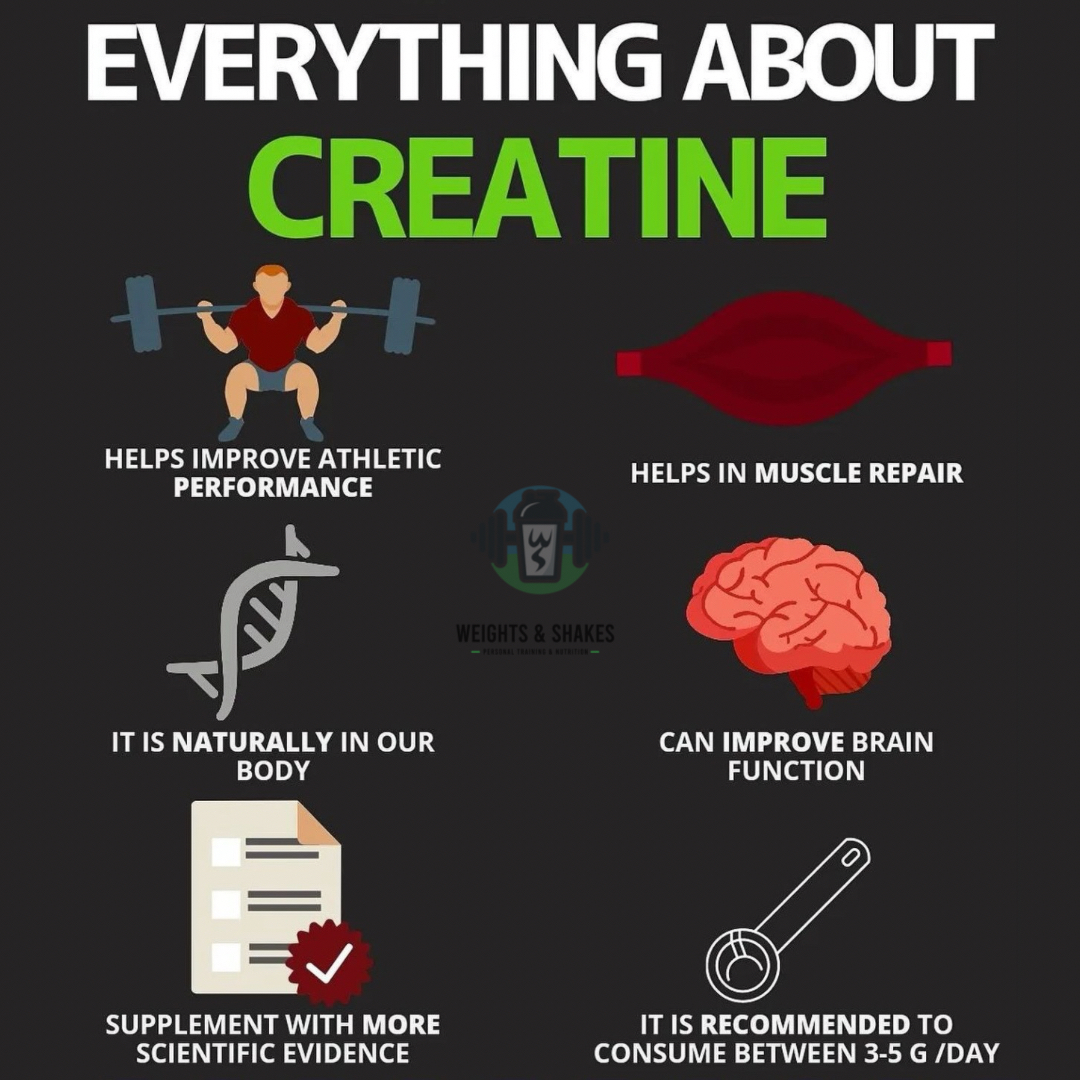Sign Up for Newsletter
Creatine is one of the most researched and widely used supplements in the fitness world, praised for its ability to enhance athletic performance, increase muscle mass, and boost strength. Whether you are a professional athlete or someone looking to elevate your workout, creatine can be a game-changer. This article will explore the benefits of creatine, the suggested dosage for different weight classes, how it’s consumed, its advantages as a supplement, and what foods are high in creatine. We’ll also dive into the potential drawbacks to provide a balanced view of its use.

What Is Creatine?
Creatine is a naturally occurring compound found in the muscles, where it plays a critical role in producing energy during high-intensity exercise. It’s composed of three amino acids: arginine, glycine, and methionine. Roughly 95% of the body’s creatine is stored in muscles, with the remainder distributed in the brain and other tissues. Creatine is most commonly known for its ability to help the body produce more ATP (adenosine triphosphate), the primary energy currency of cells.
Benefits of Creatine
1. Improves Strength and Power Output
Creatine’s main function is to regenerate ATP in the body, which allows muscles to work harder and longer during high-intensity activities like weightlifting and sprinting. Numerous studies have shown that athletes who supplement with creatine can experience a significant increase in their strength and power output compared to those who don’t.
2. Enhances Muscle Growth
Beyond its immediate impact on strength, creatine also helps stimulate muscle growth. One of the ways it does this is by increasing the water content in muscle cells, which can lead to an increase in muscle size (cell volumization). Moreover, creatine boosts the production of proteins necessary for muscle repair and growth, particularly following intense exercise.
3. Improves Athletic Performance
Whether you’re a sprinter, a weightlifter, or involved in any sport that requires short bursts of explosive movement, creatine can enhance your performance. It helps replenish ATP faster, which allows athletes to train at a higher intensity and recover quicker between sets or intervals.
4. Faster Recovery Post-Exercise
Creatine can reduce muscle cell damage and inflammation after exhaustive exercise, accelerating recovery. This means you’re likely to experience less soreness and get back into your workouts sooner with less downtime.
5. Supports Brain Health
While creatine is primarily known for its effects on muscle performance, recent research has shown that it also benefits the brain. Creatine can improve mental fatigue, memory, and cognitive function. For example, it’s been shown to be beneficial for tasks that require short bursts of intense mental effort, much like how it aids in physical exertion.
How Much Creatine Should You Take?
The recommended dosage of creatine often depends on your body weight and the phase of creatine use. It is typically divided into two phases: the loading phase and the maintenance phase.
1. Loading Phase
During the loading phase, the goal is to saturate your muscles with creatine, and this phase usually lasts for 5-7 days. A general guideline is to take 0.3 grams of creatine per kilogram of body weight per day. For example:
- For someone weighing 150 lbs (68 kg): Multiply 68 kg by 0.3 grams, which equals 20 grams of creatine per day during the loading phase.
- For someone weighing 200 lbs (91 kg): Multiply 91 kg by 0.3 grams, which equals roughly 27 grams per day.
These daily amounts are typically divided into 4-5 servings throughout the day.
2. Maintenance Phase
After the loading phase, the maintenance phase ensures that muscle stores of creatine remain elevated. The suggested dosage is 3-5 grams per day, regardless of body weight, during this phase. Some people skip the loading phase entirely and start with the maintenance dose; this approach still leads to muscle saturation, but it takes longer (about 3-4 weeks).
How is Creatine Consumed?
Creatine is most commonly consumed as a powder mixed into water, juice, or a post-workout shake. It’s also available in capsule or liquid form. The powder form, particularly creatine monohydrate, is the most studied and cost-effective type. To maximize its absorption, it’s often recommended to take creatine with a carbohydrate or protein source, as this can enhance uptake into the muscles.
Foods High in Creatine
Creatine is naturally found in various animal products, but to reach the amounts required for performance enhancement, supplementation is necessary. Still, incorporating creatine-rich foods into your diet can be beneficial. Some of the top food sources include:
- Red Meat: Beef is particularly high in creatine, with around 5 grams per kilogram.
- Pork: Contains about 4-5 grams per kilogram.
- Fish: Salmon, herring, and tuna are excellent sources, with herring containing as much as 6.5 grams per kilogram.
- Chicken: Though slightly lower in creatine than beef and fish, chicken still offers a moderate amount.
Keep in mind that you would have to eat a large amount of these foods to match the levels provided by supplementation. For example, you would need to consume over 2 pounds of beef to get 5 grams of creatine.
Pros of Creatine Supplements
- Proven to Increase Muscle Mass and Strength: Backed by years of scientific studies, creatine is one of the most effective supplements for building muscle and increasing strength.
- Enhances Recovery: Reduced muscle soreness and quicker recovery mean fewer missed workout days.
- Convenient and Cost-Effective: Compared to relying on food alone, supplements provide a quick and easy way to meet creatine needs without excessive food consumption.
- Improved Cognitive Function: Emerging research shows benefits for mental clarity and reduced fatigue.
Cons of Creatine
- Weight Gain: Since creatine causes water retention in muscles, some people experience temporary weight gain, which may be undesirable for athletes needing to maintain a specific weight class.
- Digestive Issues: Some individuals report bloating, cramping, or digestive discomfort when taking large doses during the loading phase.
- Not Ideal for Endurance Athletes: While creatine is great for short bursts of power, it’s less effective for endurance athletes who rely more on long-term, aerobic energy systems.
- Inconsistent Results in Some Users: A small percentage of individuals (often referred to as “non-responders”) do not experience significant benefits from creatine supplementation.
Creatine is a powerhouse supplement for anyone looking to improve muscle mass, strength, and athletic performance. With well-documented benefits across the board, it’s one of the safest and most effective options available for fitness enthusiasts. While there are a few minor drawbacks, such as weight gain or potential digestive discomfort, the benefits far outweigh the cons. Whether you choose to consume creatine through food or supplementation, integrating it into your workout regimen can significantly improve your results, provided you follow the correct dosage based on your weight class.
At Weights & Shakes, we’re dedicated to helping you fuel your fitness journey the right way. Whether you’re looking to optimize your muscle growth with creatine, or learn how to make the best dietary choices, we’re here to support your goals. Check out our range of personalized protein shakes and nutrition coaching services to power your workout performance and keep you on track with your health. Follow us for more tips, product updates, and tailored fitness advice to get the most out of your training.
Sources:
1. Kreider, R. B., Kalman, D. S., Antonio, J., Ziegenfuss, T. N., Wildman, R., Collins, R., … & Lopez, H. L. (2017). International Society of Sports Nutrition position stand: safety and efficacy of creatine supplementation in exercise, sport, and medicine. Journal of the International Society of Sports Nutrition, 14(1), 18.
2. Rawson, E. S., & Persky, A. M. (2007). Mechanisms of muscular adaptations to creatine supplementation. International SportMed Journal, 8(4), 115-126.
3. Smith, A. E., Fukuda, D. H., Kendall, K. L., & Stout, J. R. (2011). The effects of creatine supplementation on renal function. International Journal of Sport Nutrition and Exercise Metabolism, 21(6), 437-442.
4. Tarnopolsky, M. A. (2010). Caffeine and creatine use in sport. Annals of Nutrition and Metabolism, 57(Suppl. 2), 1-8.
Related Articles
Health & Wellness, Uncategorized




